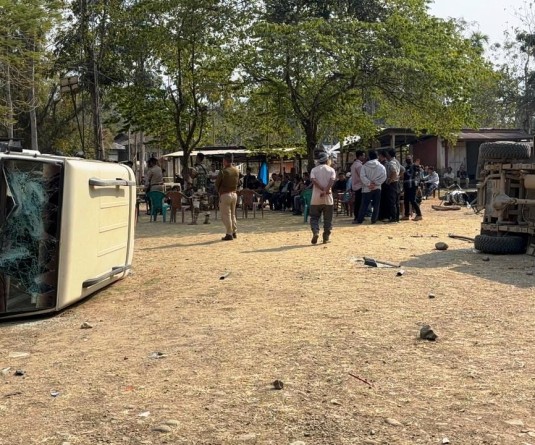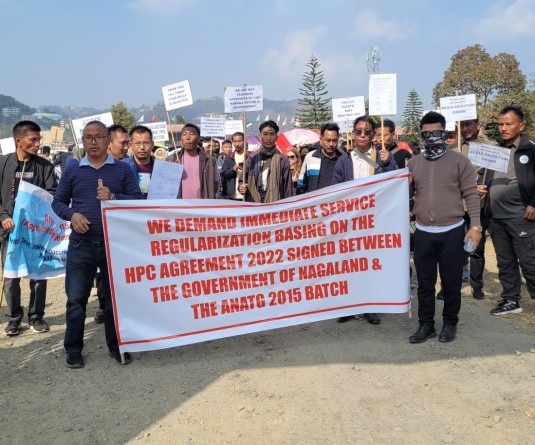
DIMAPUR, SEPTEMBER 5 (MExN): The Naga Hoho has urged the Nagaland government to recognize the displace people of Myanmar as People of Concern (POC) and extent all possible help and support and arrange border area humanitarian support team.
In a representation addressed to Chief Minister Neiphiu Rio, the Naga Hoho said the repressive military regimes in Myanmar since 1962 had taken untold miseries on the Naga people. The difficult terrain, lack of connectivity, roads, schools, health care and any other development infrastructure that is essential for any people to live with some dignity.
There is forced labour, porter, conscription into military, forced conversion and perpetual violation of human rights under the present regime. To escape from all these atrocities, many have been internally displaced (IDPs) and many have fled to the Naga areas of India.
It stated that the Nagas in Myanmar are the poorest, most isolated and least developed people in Myanmar. Economically, Nagas in Myanmar depend on land and forest and there are hardly any opportunities for livelihood. Their access to education is at minimum as there were no educational institutions for decades. It was only some 40 years ago that some primary schools were established.
Out of 390 Naga villages in Naga Self Admin Zone, the Myanmar government recognized only 266 villages and refused to recognize 32% of the Naga villages. This non-recognition meant, there are no schools in 124 villages and the children receive no education. Even the children of the 242 villages supposedly having primary schools also receive no education due to non availability of proper school buildings and teachers, the representation stated.
There are only 13 high schools and 11 middle/post primary schools which are located at townships, sub-townships and bigger villages. These schools also have their own limitation and challenges as few teachers mostly from other ethnic groups and regions refused to stay regularly in the remote areas without any incentives and support from the governments. Till now there is no college or university in the entire Naga areas. For college/university, they have to go to Kalay, Monywa, Myikyitna, Mandalay, Yangon etc, the representation said.
The representation also highlighted the lack of proper health care systems across the Naga administrative regions. Such is the case that in the year 2016 the measles claimed over 80 people as per record while there were many unaccounted in the remote villages, it said.
The common diseases among the Nagas are diarrhea, dysentery, malaria, typhoid, tuberculosis, respiratory tract infections, musculoskeletal pain, Hepatitis B & C, kidney failure and stones and also high concentration of rickets.
Low vaccination coverage is also an issue due to its remoteness, leaving the people vulnerable to preventable diseases. It said health care system is provided only through 7 health care centres/hospitals, each for the 3 townships and 4 sub-townships, but having only 2 doctors and few nurses to assist.
With an estimate of about 5000-6000 Nagas from Myanmar living in Nagaland state since their arrival beginning 1970s, they have been treated as kins and given relief and support by individuals, families, village communities and authorities, churches and civil societies in Nagaland.
To add more to the wounds, the military coup in February 2021 leading to Civil Disobedience Movement (CDM) resulted in new displacements with thousands fleeing into India, particularly in Mizoram state, and hundreds into Nagaland state. These new entrants in Nagaland are facing security and humanitarian crisis – food and shelter, and they have very little access to education, the representation stated.
Despite this, the Naga Hoho said it was yet to see any concrete and open policy coming from the Nagaland state government towards the Naga refugees’ problems from Myanmar. It, therefore, called upon the state government to recognize the Nagas from Myanmar as ‘People of Concern’ and efforts to provide aid and support on a steadfast manner must be established.
Recommendations
Towards this, the Naga Hoho recommended the state government provide humanitarian assistance by providing food and shelter; engage diplomatic community in India, the international community UNHRC for working on the refugee status for the Naga refugee in the state INGOs to sustain long-term humanitarian assistance, and grant asylum status to asylum seekers.
On education, the Naga Hoho said the state government can provide free education in Nagaland, accommodation for the students and develop scholarship programs for students in higher education. On health care aspects, the state government was urged to provide free of cost medical health care facilities in Nagaland, develop health training programs to build community health workers.
As part of capacity building & empowerment, the state government can provide skill and knowledge development trainings and develop special programs to capacitate them.
The representation also urged the state government to allow free passage at the border and ensure for their security while living in Nagaland.





